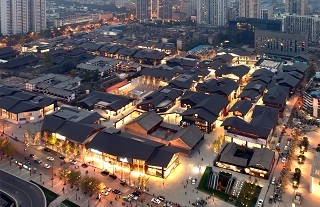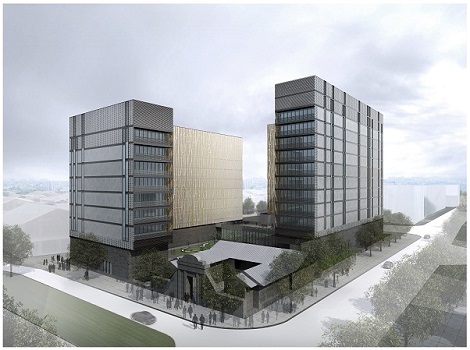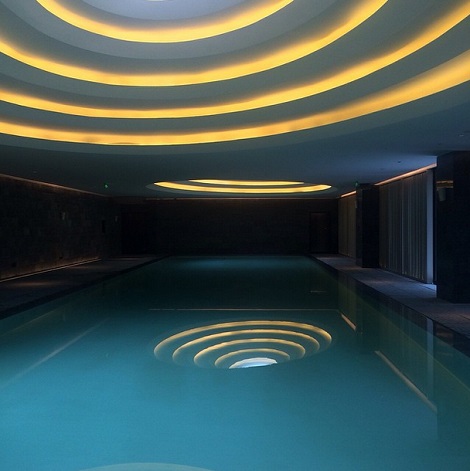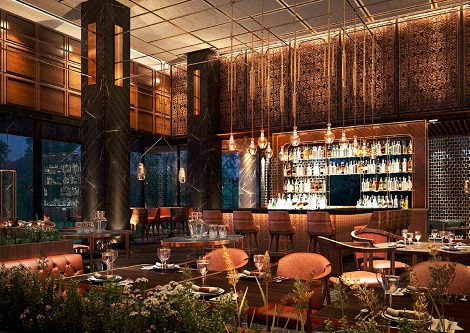
Swire Hotels is preparing for the launch of its third “House” property – The Temple House in Chengdu in July 2015. The 100 room and 42 serviced apartment property is part of a joint venture retail complex development between Swire Properties and Sino-Ocean Land, Sino-Ocean Taikoo Li Chengdu.

Shopping area
The open-plan, low-rise and lane-driven shopping precinct is in the heart of Chengdu’s downtown shopping district with a direct connection to the metro station, yet close to the thousand-year-old Daci Temple.

Artist drawing of the property
Speaking to Business Traveller, the Managing Director of Swire Hotels, Brian Williams said that the aim of the new Temple House Hotel was to create a relaxing and modern hotel that would celebrate its historic location.
“In Asia you have some of the best hotels in the world, but particularly in city centres they tend to follow a model: they are quite large, have multiple restaurants and a fairly generic design. What we’ve done with the House hotels is a sort of miniaturisation, so there are not many rooms, and the restaurants are in tune with the local market. It means that if you are one of our guests you’re not staying with a whole bunch of other travellers but instead you are delving into the lifestyle scene of that city.”

Guestroom
The property was originally slated for opening in 2014 (see online news here). Williams explained one reason the project was delayed was because of the complexity of renovating the deconsecrated temple building that now provides an entrance to the hotel.
Make architects have been involved in the design, which makes reference to the region’s “rich history of weaving and brocade, with the hotel’s outer façade featuring a perforated brickwork pattern where the window and spandrel panels are ‘woven’ together with brick to create a rich interlocking pattern”, according to In House, Swire Hotels magazine (Click here for the latest edition). Meanwhile, AvroKO designed the three restaurants and bars.

Bathroom
As well as the renovated temple building the hotel consists of a large grassed courtyard, two bars, both indoor and outdoor, as well as a tea room and spa – both named Mi Xun.

Spa pool
“The Daci Temple is the biggest and most famous in Chengdu and there’s a history of the monks and vegetarian food so we’ve borrowed some recipes along with a very interesting tea presentation, combining the two for a really wonderful café”, explained Williams.

Temple cafe
Other restaurants include an Italian called Tivano, similar to Sureno in The Opposite House and The Temple Cafe

Tivano
Williams confirmed that the fourth House property will open in Shanghai in 2017 – though the exact name has yet to be determined. He said the reason for the individual names is that the House Collective was about “endorsed branding rather than primary branding” like the Swire East Hotels in Hong Kong, Beijing, and soon-to-open East Miami in the U.S.
“We endorse these hotels with the “House” collective, but each of them has its own identity and that resonates with the guests who don’t want to go to Chengdu and see a replica of the Upper House. They want something original but which follows the DNA, so it is small scale, upper scale but with great design, a good use of technology and with a real life in the bars and restaurants.”
Compared with the five star offerings of other hotel companies, Williams said that the House properties had the advantage of not being designed purely for maximising management fees, where the larger the property, the bigger the management fee for the company managing it. Instead the hotels are intended to enhance the area in which they are situated, creating a sort of “halo” effect to the asset as a whole and allowing Swire Hotels to concentrate on creating unique luxury hotels with only a small number of rooms.
Williams said that each of the House hotels is deliberately aimed at attracting niche business sectors: “Conventionally, hotels in big cities have aimed at attracting the financial services sector because those were traditionally where you got the high rate. In many cases the change of mentality in procurement of travel has meant those days are over, so we are looking at other industries with a very different clientele – music, media, entertainment, fashion, sport, entrepreneurs, design and architects. They very much appreciate the design-driven, lifestyle driven hotels we offer.”
For more information, visit: thetemplehousehotel.com








